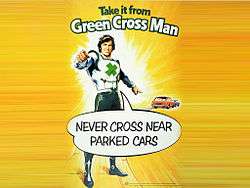Green Cross Code

The Green Cross Code is a brand created by the National Road Safety Committee (now the Royal Society for the Prevention of Accidents, RoSPA) to raise awareness of pedestrian road safety in the United Kingdom. The multimedia Green Cross Code campaign began in 1970 and continues today.
The Green Cross Code replaced the earlier 'Kerb Drill' pedestrian safety campaign; the Kerb Drill's military style ("Halt! Quick march!") was deemed confusing to children by safety authorities.
Tufty Fluffytail

Prior to the introduction of the Green Cross campaign, a series of puppet animation public information films, featuring Tufty Fluffytail and narrated by Bernard Cribbins OBE were in regular broadcast rotation across the UK. Tufty Fluffytail, a childlike red squirrel character, was created in 1953 by Elsie Mills MBE to introduce clear and simple safety messages to children. The success of the character led to the creation in 1961 of the Tufty Club for children under five years of age. Under its auspices more than 30,000 Tufty books about road safety were issued to parents. At its peak there were nearly 25,000 branches of the Tufty Club throughout the UK, and by the early 1970s an estimated two million children were members. The movement continued into the 1980s.[1]
The code
The Green Cross Code itself is a short step-by-step procedure designed to enable pedestrians to cross streets safely. While the Code has undergone several changes over the years, the basic tenets ("Stop, Look, Listen, Think" or "Stop Look Listen Live".) have remained more or less the same. The 2005 version of the Green Cross Code reads as follows:
- THINK! Find the safest place to cross, then stop.
- STOP! Stand on the pavement near the kerb.
- USE YOUR EYES AND EARS! Look all around for traffic, and listen.
- WAIT UNTIL IT'S SAFE TO CROSS! If traffic is coming, let it pass.
- LOOK AND LISTEN! When it's safe, walk straight across the road.
- ARRIVE ALIVE! Keep looking and listening
Green Cross Man
| Green Cross Man | |
|---|---|
|
Take it from Green Cross Man | |
| First appearance | 1970 |
The Green Cross Man is a costumed superhero character created in 1970 as an aid to teaching young children the Green Cross Code, and for promoting general road safety. British actor David Prowse MBE played the character in a series of Public Information Films (PIFs) sponsored by the Central Office of Information for the UK Department of the Environment. The light-hearted spots ran on UK television from 1975 to 1990.
In the films, Green Cross Man has the power to teleport from his monitoring station at Green Cross Control to any location where children are in need of pedestrian safety instruction. He accomplishes this by use of a wristwatch-like "dematerialiser" device.
On these missions he is sometimes accompanied by a whimsical robot companion. His signature exclamation of surprise or disbelief is "Green Crosses!" and his slogan is "I won't be there when you cross the road / So always use the Green Cross Code."
Other campaigns
In 1976, actor Jon Pertwee, the Third Doctor on the television series Doctor Who, appeared in a PIF for the Green Cross Code introducing the mnemonic "SPLINK", which stood for:[2]
- (First find a) Safe (place to cross, then stop)
- (Stand on the) Pavement (near the kerb)
- Look (all round for traffic and listen)
- If (traffic is coming, let it pass)
- (When there is) No (traffic near, walk straight across the road)
- Keep (looking and listening for traffic while you cross).
The film was later updated to cartoon form, voiced by Derek Griffiths.[3]
In 1983, the television adverts employed a "Green Cross Code" rap based on the hit "The Message" by Grandmaster Flash. The original lyrics of "Don't push me cos I'm close to the edge" were replaced with "Don't step out when you're close to the edge." The advert was re-released for its 10th anniversary in 1993 with slightly different lyrics.
See also
References
External links
- Hedgehogs.gov.uk (The 2005 Green Cross Code website)
- RoSPA
- Think! Road Safety (UK Department for Transport)
- Official Website of David Prowse
- Public information films from the BBC
| ||||||||||||||||||||||||||||||||||||||||||
